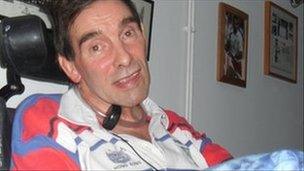Wiltshire 'right to die' man seeks High Court ruling
- Published

Tony Nicklinson was left with "locked in syndrome" after suffering a stroke six years ago
A severely disabled man from Wiltshire is to ask the High Court to allow a doctor to end his life.
Tony Nicklinson, 57, is paralysed from the neck down after suffering a stroke in 2005 and wants a doctor to be allowed to terminate his life.
His lawyers want that doctor to have a "common law defence of necessity" against any possible murder charge.
Solicitor Saimo Chahal said the case raised "difficult legal, moral and ethical questions about euthanasia".
'So cruel'
In a statement released through his solicitors, Mr Nicklinson said that being able to die at home, at the right time, would be "a good death".
"What I have to look forward to is a wretched ending with uncertainty, pain, and suffering while my family watch on helplessly," he said.
"Why must I suffer these indignities? If I were able bodied I could put an end to my life when I want to. Why is life so cruel?"
A spokesman for law firm Bindmans, which represents Mr Nicklinson, confirmed he had issued proceedings in the High Court asking for declarations that it is lawful for a doctor to terminate his life, with his consent and with him making the decision with full mental capacity.
Ms Chahal added: "Tony's case is a very compelling one and ultimately it is for the court to weigh up the evidence and to decide."
Mr Nicklinson, from Melksham, has been married to his wife Jane for 25 years and has two daughters.
He was left with "locked-in syndrome" following a stroke and cannot speak or move anything except his head and eyes.
His lawyers said he is mentally competent, can make decisions about life and believes fervently in the right to self determination.
A spokesman for Bindmans said: "He communicates through the use of a Perspex board or by using his Eye-Blink computer and sums up his life as 'dull, miserable, demeaning, undignified and intolerable'.
"He is too physically disabled to take his own life but he wants the right to self-determination, just like any able-bodied person, who can choose to take his or her own life."
- Published12 February 2011
- Published14 December 2010
- Published19 July 2010